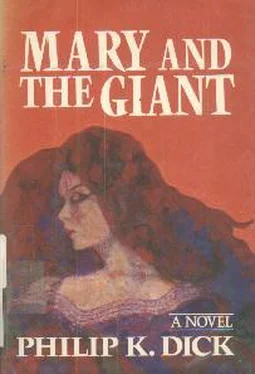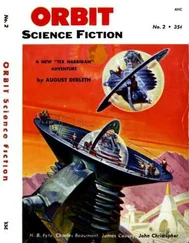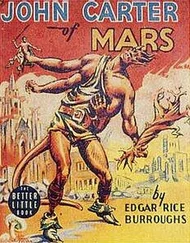Philip Dick - Mary And The Giant
Здесь есть возможность читать онлайн «Philip Dick - Mary And The Giant» весь текст электронной книги совершенно бесплатно (целиком полную версию без сокращений). В некоторых случаях можно слушать аудио, скачать через торрент в формате fb2 и присутствует краткое содержание. Жанр: Фантастика и фэнтези, на английском языке. Описание произведения, (предисловие) а так же отзывы посетителей доступны на портале библиотеки ЛибКат.
- Название:Mary And The Giant
- Автор:
- Жанр:
- Год:неизвестен
- ISBN:нет данных
- Рейтинг книги:4 / 5. Голосов: 1
-
Избранное:Добавить в избранное
- Отзывы:
-
Ваша оценка:
- 80
- 1
- 2
- 3
- 4
- 5
Mary And The Giant: краткое содержание, описание и аннотация
Предлагаем к чтению аннотацию, описание, краткое содержание или предисловие (зависит от того, что написал сам автор книги «Mary And The Giant»). Если вы не нашли необходимую информацию о книге — напишите в комментариях, мы постараемся отыскать её.
Mary And The Giant — читать онлайн бесплатно полную книгу (весь текст) целиком
Ниже представлен текст книги, разбитый по страницам. Система сохранения места последней прочитанной страницы, позволяет с удобством читать онлайн бесплатно книгу «Mary And The Giant», без необходимости каждый раз заново искать на чём Вы остановились. Поставьте закладку, и сможете в любой момент перейти на страницу, на которой закончили чтение.
Интервал:
Закладка:
That seemed to intrigue her. "Intricate? In what way?"
"You're partly very young, very inexperienced and naive." He studied her intently. "And at the same time you're completely practiced. Even somewhat unscrupulous."
"Oh," she said, nodding.
"Why did you change your mind? Why did you decide to come back and work for me?"
"Because," she said, "I got tired of working at the phone company.
"Is that all?" He didn't believe it.
"No. I-" She floundered. "A lot of things happened to me. Somebody I depended on let me down. Now I don't feel the same way about him, or about anything."
"You were afraid of me, weren't you?"
"Yes," she admitted, "very much."
"But not now?"
She pondered. "No. I see you differently, and I see myself differently."
Schilling hoped it was true. "What did you do with the ten dollars?" he asked.
"Gave it to Paul Nitz."
"Then you're broke?"
She smiled. "Yes, broke."
"So I suppose you're going to borrow another ten dollars tomorrow."
"Can I?"
"We'll see."
Her eyebrows went up. "We will, will we?"
The store was empty. Outside, the late afternoon sun sent up a glare from the sidewalk. Schilling walked over to the window and stood with his hands in his pockets. Finally, to quiet his various emotions, he lit a cigar.
"Put that stinky thing out," Mary Anne ordered. "How do you suppose that smells to customers?"
He turned around. "If I invited you to dinner, what would you say?"
"It depends where." She seemed, instantly, to fold up in wariness; he was aware of her change in mood.
"What's a good place?" he asked.
She reflected. "La Poblana, up along the highway."
"All right, we'll go there."
"I'll have to change to go there. I'll have to get my heels and suit again."
He demolished her anxieties with the hand of quiet reasonability. "When we close the store, I'll drive you over to your apartment and you can change."
With relief he heard her say: "Fine." Pleased and gratified, he put out his cigar and, going into the back office, began preparing the Columbia order sheet.
It was a routine job he did not usually enjoy, but he enjoyed it this time; he enjoyed it very much.
14
That night he took her to dinner. And four nights later, on Saturday, he took her with him to a wholesaler's party in San Francisco.
As the two of them drove up the peninsula, Mary Anne asked: "Does this car belong to you?"
"I bought this Dodge back in '48. A package deal; it came along with Max." He added: "I gave up heavy driving." His eyes had become bad and he had, one night, hit a parked milk truck. He didn't tell the girl that.
"It's a nice car. It's so big and quiet ..." She watched the dark fields passing on either side of the highway. "What will this party be like?"
"You're not scared, are you?"
"No," she said, sitting very upright beside him, her hands around her purse. She had put on what looked to him like a pair of black silk pajamas; the trousers were tied around her bare ankles and the shirt flared out into a great pointed collar. On her feet were little flat slippers, and her hair was tied back in a foreshortened ponytail.
As she had skipped out of her apartment house and into the car he had observed: "Your hair is too short for a ponytail."
Breathlessly, she had settled beside him and slammed the car door. "Is this too arty? Am I dressed wrong?"
"You look wonderful," he had said in all honesty as he started up the car.
But she was, in spite of what she said, a little frightened. In the gloom of the car her eyes were large and serious, and she had almost nothing to say. Once, she got her cigarettes from her purse and bent toward the dashboard lighter.
"This may be fun," he said, to cheer her up.
"That's what you told me."
"Leland Partridge is a fanatic, what we call an 'audiophile.' There'll be speakers as large as houses, diamond cartridges, hi-fi recordings of freight trains and glockenspiels."
"Will there be very many people there?" she asked again, for the third time.
"People from retail, plus some of the San Francisco musical crowd. There'll be drinks and plenty of talk. You may hear some good arguments when the sound boys and the legitimate musicians tangle."
"I love San Francisco," Mary Anne said with ardor. "All those tiny bars and restaurants. Once I went to a place out in North Beach, with Tweany. Something called The Paper Doll. We heard a Dixieland pianist ... he was cool."
"Cool," Schilling echoed, grimacing.
"He was quite good." She tapped her cigarette with her finger; sparks swept out the window into the darkness. From the car radio filtered the sounds of a Haydn symphony.
"I like that," she said, inclining her head.
"Do you recognize it?"
She meditated. "Beethoven."
"It's the Haydn Drumroll Symphony."
"Do you think I'll ever learn to tell what a piece is? Will I be as old as you?"
"You're learning," he said, as lightly as possible. "It's a question of experience; nothing more."
"You really love that music. I've watched you ... you're not pretending. It's the same way Paul is about his music. You sort of-drink it up. You try to get all of it."
"I like your friend Nitz," he said, although, in some ways, he was disturbed by the man.
"Yes, he's a lovely person. I don't believe he could ever do anybody harm."
"You admire that."
"Yes," she said, "don't you?"
"I admire it in the abstract."
"Oh, you and your abstract." She settled in a heap against the door, her legs drawn up under her, one arm resting on the windowsill. "What are those lights up there?" She sounded apprehensive. "Are we almost there?"
"Almost. Pull your courage together."
"It's together. Don't make fun of me."
"I'm not making fun of you," he said gently. "Why should I make fun of you?"
"Will they all laugh at what I say?"
"Of course not." He couldn't help adding: "They'll be making so much racket with their sound effects records they won't hear what you say."
"I don't feel good."
"You'll feel better when we get there," he assured her with fatherly sympathy, speeding up the car.
The party was already in progress when they arrived. Schilling noted the transformation in the girl as she climbed the steps to Partridge's house. Her fear vanished below the surface; face impassive, she lounged against the iron railing of the porch, purse in one hand, the other hand draped over her trousered knee. As soon as the door opened she slipped to her feet and passed by the man at the entrance. She had already gone into the hall and was approaching the living room full of noise and laughter when Schilling stubbed out his cigar and stepped inside.
"Hello, Leland," he said to his host, shaking hands. "What became of my girl?"
"There she goes," Partridge said, closing the door. He was a tall, middle-aged man with glasses. "Wife? Mistress?"
"Counter girl." Schilling removed his overcoat. "How's the family?"
"About the same." Arm on Schilling's shoulder, he led him into the living room. "Earl has a cold, again; it's the same flu we all got last year. How's the store?"
"Can't complain."
They both stopped to watch Mary Anne. She had picked out Edith Partridge and was accepting a drink from her hostess's tray. Apparently at ease, Mary Anne turned to meet a band of young record clerks grouped around a table. On the table was a display of sound components: turntables, cartridges, tone arms. Elements of the Diotronic binaural system.
"She's got savoir faire," Partridge said. "For a girl that young it's unusual. My oldest is about her age."
"Mary," Schilling said, "stroll over and meet your host."
She did so, and the introductions were made.
Читать дальшеИнтервал:
Закладка:
Похожие книги на «Mary And The Giant»
Представляем Вашему вниманию похожие книги на «Mary And The Giant» списком для выбора. Мы отобрали схожую по названию и смыслу литературу в надежде предоставить читателям больше вариантов отыскать новые, интересные, ещё непрочитанные произведения.
Обсуждение, отзывы о книге «Mary And The Giant» и просто собственные мнения читателей. Оставьте ваши комментарии, напишите, что Вы думаете о произведении, его смысле или главных героях. Укажите что конкретно понравилось, а что нет, и почему Вы так считаете.










